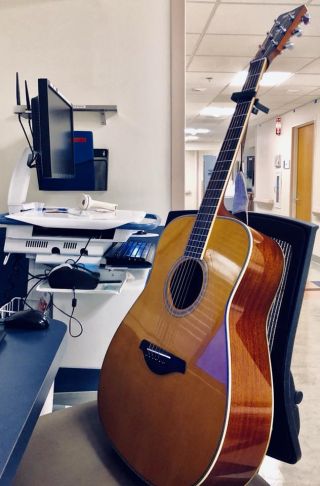Creativity
Things I’ve Learned as a Music Therapist
Personla Perspective: In a hospital setting, music is profound, powerful, and healing
Posted August 14, 2024 Reviewed by Gary Drevitch
Key points
- Music therapy in a hospital setting can be very powerful, profound, and healing.
- Music, for those who are suffering, can bring some humanity into their healing process.
- When there is nothing left, we still have music.

One of the great things about my job as a music therapist working in a hospital is that I learn something on an almost daily basis. And I learn all of these things from the people I share music with, people who are working through unbelievable challenges, both physically and mentally. Here are some of the things that I’ve learned that have truly affected me:
Music Creates Connection
So many times, I walk into a hospital room and the visitors are sitting in various spots, or in corners, and seemingly distracted. Sometimes, distracted in their own thoughts and reflections, sometimes on their phones. And I know that a lot of that has to do with coping with the situation. But, almost like hitting a switch, when music is introduced, they come together. They connect. They connect with the patient. They connect with each other. And they connect with the music.
She’s in her 90s and recently moved to hospice care. Her eyes were closed, and she was mainly non-responsive, but seemed comfortable. Her family was there: her adult daughter, her grandson and a friend. Everyone seemed to be in their own little world, as if waiting for… I said, "hello" and offered some music, for comfort. “Sure,” her daughter said. I took out my guitar and played a little. Then I transitioned into an easy version of "Somewhere Over the Rainbow." And then… all three moved to the bed. And then… they took her hands... and they all joined in singing. And in beautiful harmony! The patient suddenly opened her eyes and looked lovingly into her grandson’s gaze as he sang to her. An incredible smile overtook her face… and his too, through his tears. It was such a profound and beautiful moment that I don’t think they will ever forget. (And neither will I.) All because of…music.
Music Is the Universal Language
In the hospital, there are many languages. And sometimes that can be a barrier in the healing process. But I am lucky. I have music. Yes, music is the universal language. Especially when you are alone, sick, afraid, and unsure.
“He speaks no English so we can’t really talk with him. And he’s had no visitors,” the nurse told me when she asked me to visit with him. He’d already been isolated in the hospital for some time receiving cancer treatment. I walked into his dark room, and it was so quiet I could hear the IV drip. He looked at me and I showed him the guitar and gestured to a chair as if to ask, “May I sit?” He tentatively shook his head “yes." He was in bed with the covers pulled up and looked weak. I just started playing something soothing, offering some music for comfort. He was looking straight up but seemed to be listening. After a few moments, though, I noticed his feet slowly moving. I kept the rhythm solid. And then, some movement in his head. I followed him with the music, adding a little more structure. Gradually, his eyes opened fully and slowly his body seemed to… activate. He transformed—and the music followed. More rhythm. More movement. And soon, it felt as though we were… grooving? He looked at me with a big smile. And the movement in his body seemed to give him some energy. I eventually worked my way to ‘One Love’ without even thinking about it and starting singing. He pointed at me, laughed, and said “Ahhh…” Of course he knew Bob Marley! He took it in. He felt the music. He could not stop smiling. No words were spoken for the time I was there. There was no need. We had music. Then as I was about to walk out—three words… “Come back again.”
Music Brings Hope Where Hope Seems Hard to Find
Music can help in many ways, including reducing anxiety and pain, helping with coping with treatment, or as a prompt for emotional outlet. But the best thing that music can provide when someone is hurting is hope.
“What's that song about?” I asked the group, at an in-patient behavioral health facility where I was running a music therapy session, after listening to "Don’t Stop" (Fleetwood Mac). There was silence. Many looking down with flat, tired faces. No eye contact between anyone. But then, a quiet voice from a young woman sitting to the side, “Maybe that things will be different tomorrow? Maybe better? Maybe it won’t be the same as it was before?” Then, with tears in her eyes she looked up and said, “The song is about hope.” I played the song again and one of the older women, who was sitting on the other side, got up, walked over, and took her hand… and they started dancing. Soon the flat, tired faces showed some smiles. Soon… more got up to dance. One of the nurses joined in. Suddenly there was laughter, connection, and some sense of joy in a mostly joyless place. And… a feeling of hope filled the room. Music for reflection. Music for empowerment. Music to create hope for a better tomorrow.
When There Is Nothing Left, We Still Have Music
The most profound work for me in the hospital is with patients at the end of life; providing music and comfort for them, and their families, as they are about to "transition." There is sadness and reflection, but there is also a sense of resolve, contentedness, and even joy in its own way. One of the most powerful moments for me happened a few years ago when someone said to me, after I provided music for their mother during her final moments, “You realize, that is the last music she will ever hear.” I will never forget the feeling that came over me when he said it. But also powerful are the connections that are created between the person leaving and the person saying goodbye.
When I walked into the quiet room, his adult daughter was sitting next to the bed holding his hand. She didn't hear me enter, so I gently said, "Hello." She looked up and gave a slight smile through pensive eyes. He was mainly non-responsive at this point, but seemingly comfortable—and very near the end. I offered some music, for comfort (thinking for both of them.) She again gave a slight smile and returned her gaze back to him. I started slowly on the guitar with a little 'soundscape' and eventually merged into a 'lullaby' version of ‘Can't Help Falling in Love’. As I started to sing, she snapped her head around and looked right at me with wide eyes, startling me enough to stop. A few tears glistened on her face. After a pause she said, "That song... He used to sing me to sleep to that song when I was a little girl." I caught my breath… and then I said, "Should I continue?" A nod "yes." She was still holding my eye contact but seemed a little unsure. So I asked, "Would you like to sing along?" Her voice was sweet, soft, and comforting. After a verse, I backed out vocally and became her accompanist as she looked at him and sang as she held his hand. It was now her turn to sing him to sleep.
The healing power of music.
(*The stories presented in this post are based on accounts or experiences and are not actual accounts or experiences.)


